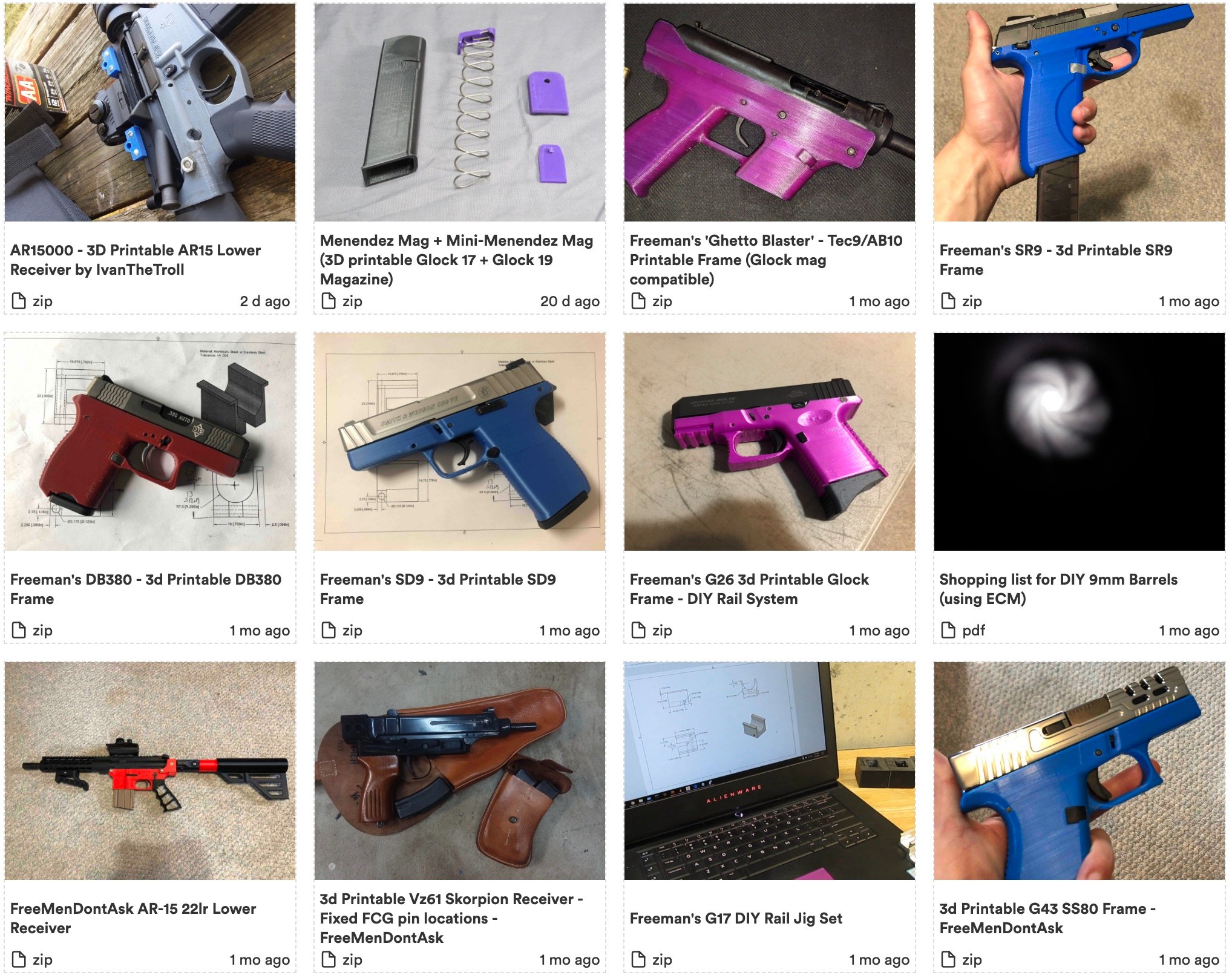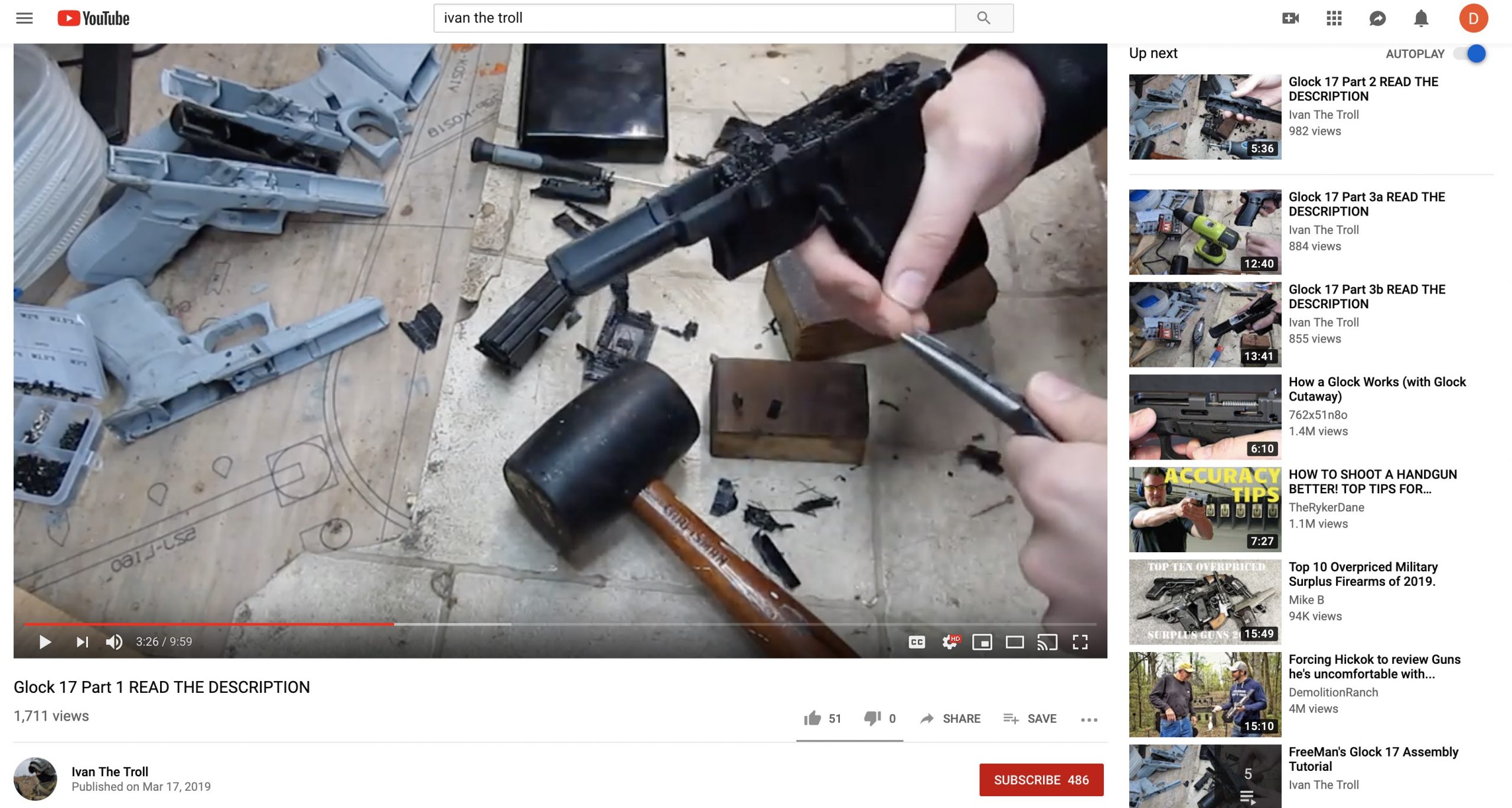Earlier this month, Reddit became the latest social media platform to aggressively enforce its ban on sharing plans for 3D-printed guns, shuttering a popular channel dedicated to the cause that had over 4,000 users.
“Filling me with spite only makes me work harder,” wrote a user known as IvanTheTroll, in a discussion thread about the shutdown posted elsewhere on Reddit. IvanTheTroll leads Deterrence Dispensed, an informal group of online activists who make and distribute files to print 3D-printed guns. The group had been active on both Twitter and YouTube before the platforms closed its accounts in late May following The Trace’s reporting. Now Reddit, once celebrated for its lack of content moderation, had done the same.
“Soooo……. rally point?” a user replied to IvanTheTroll’s message. “Keybase,” he replied.
IvanTheTroll was referring to a chat app launched by the founders of the dating site OkCupid. Keybase allows users to verify their identities by linking the app to social media accounts, and provides end-to-end encryption, with the option to set an expiration date for messages after they’re sent. In the two weeks since Reddit handed down its ban, Deterrence Dispensed’s Keybase team has become the sixth most popular on the platform, with more than 500 members.
IvanTheTroll declined to comment for this story. But Incarbonite, who runs another Keybase team dedicated to producing and distributing 3D-printed gun tech, said efforts to shut down the community were in vain. “People trying to stop the distribution of 3D printable gun files are on the losing end of history,” he said.
Keybase is one of a new crop of websites and chat servers that have emerged to fill the void left by mainstream platforms’ crackdown on 3D-printed gun files. On GunStreamer, a firearm-focused video sharing site, users post video tutorials on 3D-printed gun construction — IvanTheTroll moved his content to the platform a day after YouTube banned him. On Spee.ch, a blockchain-based media hosting site, Deterrence Dispensed makes blueprints available for AR-15s, handgun frames, and a Glock magazine dubbed the “Menendez mag” after the New Jersey senator who is pushing the major tech platforms to clamp down on 3D gun blueprints. On GitHub, another major 3D-printed gun outfit called FOSSCAD hosts blueprints for pistols, rifles, and grenade launcher ammunition.
Keybase, GunStreamer, and GitHub did not respond to requests for comment.
“Many consumers would prefer that they make choices for themselves about what they watch, read, and consume, rather than having Mark Zuckerberg or Google make those decisions for them,” said Jeremy Kauffman, the CEO of LBRY, the company that operates Spee.ch.
Kauffman added that Spee.ch would only remove 3D-printed gun files if courts determine them illegal. And even if that happened, they would remain on the blockchain, a digital protocol for storing and serving data from which content cannot be removed. “In terms of taking files off of the LBRY topper, that’s like saying you would take them off of a person’s email,” Kauffman said. “It can’t be done.” Last year, Kauffman shared an encrypted 3D gun blueprint from his personal Twitter account, signaling his support for their distribution.
3D-printed guns, otherwise known as ghost guns, can be manufactured at home from plastics and lack serial numbers, making them virtually untraceable to law enforcement. Over the past decade, 3D printers have become increasingly affordable, and the Internet has given interested parties the ability to easily share printing files and crowd source strategies for improving builds.
While printing the guns is legal, some states regulate the process. In California, any firearm, printed or otherwise, must have a serial number obtained from the state’s Justice Department. In New Jersey, individuals must obtain a federal license to manufacture firearms before printing 3D guns from home. Federally, the Undetectable Firearms Act, which sunsets in 2023, makes illegal any firearm that cannot be detected by a metal detector, so all 3D printed guns in the United States must include some metal component to comply.
But the legality of disseminating blueprints for the builds is more precarious. Last year, the Justice Department overturned an Obama-era guidance that prevented the Texas-based Defense Distributed from publishing 3D-printed gun files on its website on the grounds that publication violated the Arms Export Control Act. Days before the company planned to finally publish the files, a federal judge in Washington temporarily blocked their release, agreeing with a coalition of states which argued that allowing the files to be shared publicly would likely cause those states to “suffer irreparable harm.” That litigation is ongoing.
Doug Jacobson, an export controls attorney in Washington, D.C., said that until a clear federal determination is made, the files are technically illegal to share online. But he stressed that “while there may be a technical violation, it would be one a prosecutor most likely would not want to enforce, considering by the time prosecution moved forward, the law could be changed.”
Pending a final determination on the legality of sharing the files, several major social media platforms have opted to ban the practice. Others have revised their policies when faced with public pressure. In May, following The Trace’s reporting, Twitter issued a new policy explicitly prohibiting the sharing of 3D-printed gun plans. Reddit and YouTube had already included language in their community policies to the same effect.
But while the sites have effectively eliminated major players like Deterrence Dispensed, they’ve had significantly more trouble policing individuals. A review of recent posts on Twitter, Reddit, and YouTube reveals that links to files containing 3D-printed gun plans are still readily accessible on each platform. Some Twitter users have continued to share direct links to firearm downloads since the site’s policy changes took effect, and many tweets predating the change remain accessible through the site’s search. YouTube instructionals on how to build 3D-printed guns still have millions of views, and several Reddit threads aggregate links to online destinations for 3D-printed gun files.
The Trace used each site’s reporting mechanism to flag a handful of offending posts and found that none were taken down within six days of reporting. Only after contacting Twitter and YouTube directly about the reported posts did content moderators remove them. Twitter also removed two other tweets sharing an identical link. More than a dozen tweets and videos — some containing the same links as those deleted — remain.
In an email, a Twitter spokesperson offered no specifics of any proactive efforts to remove tweets sharing files to firearms, but said that “40 percent of the content that’s removed is now surfaced to our teams before it’s reported or seen by people on Twitter.” A Reddit spokesperson linked to the site’s community guidelines in an email. A YouTube spokesperson said it had increased enforcement for links found in video descriptions and other places on the site.
Senator Robert Menendez, who published an open letter to Twitter CEO Jack Dorsey in April of this year urging the company to be more forceful in its policing of this content, said such lapses are unacceptable, whether from a social media company or not. “All companies and individuals must comply with laws. Per a court order, it is illegal to publish 3D gun blueprints,” he said. “Social media platforms have a greater responsibility because of their massive reach; however, smaller platforms and websites such as Spee.ch and Keybase.io can’t ignore their duty to bar users from sharing such harmful content in accordance with the law.”
Facebook, against the prevailing wind in its industry, took steps last week to ease rather than tighten its restrictions around 3D-printed guns. The company updated its community standards to clarify that restrictions on discussing and promoting 3D-printed gun files apply only to private individuals. “Legitimate” businesses can freely promote on their Facebook pages that they distribute the files. They cannot, however, share files directly, or provide instructions for how to access them.
The policy change prompted Menendez to send a letter to Facebook CEO Mark Zuckerburg, urging him to revert the policy. “If Facebook takes the position that facilitating the distribution of such instructions does not violate the law, it raises the obvious issue of how Facebook plans on ensur[ing] such content from ‘a real brick-and-mortar store, legitimate website, brand or government agency’ doesn’t fall into the hands of those who should not have them,” Menendez wrote.
A Facebook spokesperson said that businesses were still prohibited from sharing 3D-printed gun files. She added that the policy is intended to clear a space for conversations around 3D-printed gun legislation and regulation.
Already, though, organizations are testing the policy’s limits.
This week, a Tennessee-based research nonprofit called Atlas Arms, which is developing a blueprint for armor-piercing bullets that it claims will be legally available to the public, partnered with Deterrence Dispensed to establish an online resource on Facebook for information related to 3D-printed gun technology. Austin Jones, who runs Atlas Arms, said sharing access to blueprints is part and parcel of that mission. He posted links to two 3D-printed gun plans in the announcement of the partnership on Facebook.
“When I found out about this rule change, I felt that we were in a unique position to help, seeing as we are legitimate organization recognized by the federal government to provide educational resources to the public,” he said. “But we wouldn’t be doing this were it not for the rule change.”
Jones added that his company would not share the files directly, and would instead share links to the Deterrence Dispensed Spee.ch page. But the two links shared by the page downloaded the files directly to the user’s computer.
A Facebook spokesperson said the site would review the content in question and take action in line with company policy. A day later, the posts were removed.


